Speeches From the Never Again March in Washington D.c. Video Youtube
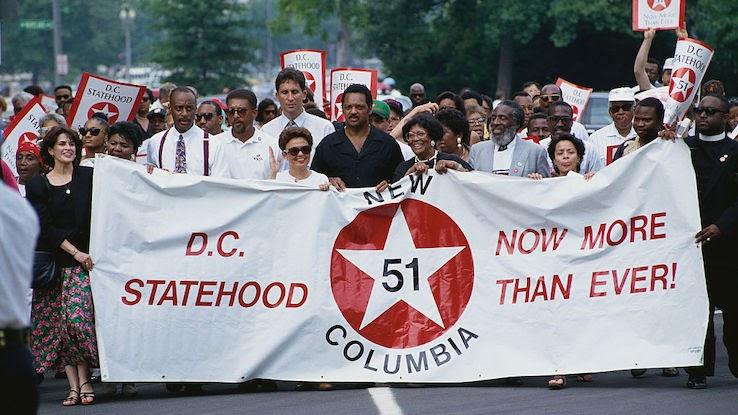
While Washington, D.C., might be home to some of the almost powerful and influential government institutions in the world, this metropolis has also floundered within a grey area between districthood and statehood throughout its existence. Many residents experience powerless to influence the results of local and national elections thanks to the district'southward non-traditional status and historically unfair voting policies, which continually raises the question of whether D.C. would ultimately benefit from being granted statehood status.
The past year has been ane of significant and remarkable change and disruption in many ways, and even D.C. has gotten its fair share of attention in the midst of the coronavirus pandemic and one of the more than significant presidential elections in contempo history. With the Business firm of Representatives' late-June 2020 approval of a pecker that would grant the district statehood — and a revival of this button expected with another House vote on the week of April xix — the idea has in one case again gained meaningful traction.
While many residents of D.C. are more than set for their commune to get the 51st state, at that place are nonetheless some hurdles to articulate before they achieve legal and political disinterestedness with other U.S. citizens. But all things considered, with its prominent role in and rich contributions to U.S. history, D.C.'s statehood may seem long overdue.
D.C.'s Early on Days Saw Flourishing Growth
Washington, D.C., has a history that's almost every bit old every bit the land it's the capital of. In the summertime of 1790, Congress passed the Residence Deed, which included provisions for establishing a national capital and permanent seat of government located on the Potomac River. The then-recently ratified U.Southward. Constitution also provided for a special administrative federal commune that would fall under Congress' exclusive jurisdiction, which is the principal reason why D.C. was never originally part of whatsoever U.South. state.
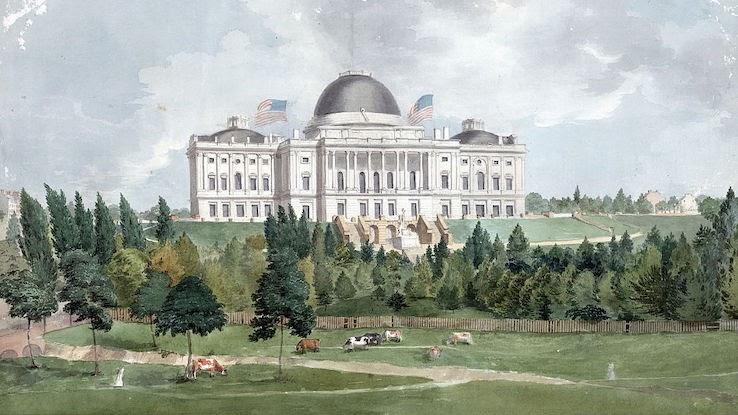
Both Virginia and Maryland donated portions of their Alexandria and Georgetown settlements, respectively, to create the commune, function of which was initially named the City of Washington — subsequently that George, the Founding Father and start president who selected D.C.'due south location. Interestingly, the Constitution specified that this district would exist no larger than "x miles square." Thus, D.C.'s original boundary was a foursquare, each side of which measured 10 miles long — a shape that's by and large nevertheless the perimeter today.
In its start few years of existence, the district only housed a few k people, many of whom moved in temporarily to work for the politicians start to settle in the area. Every bit D.C. started to take root, information technology underwent a few name changes, with commissioners and others somewhen choosing Columbia — the female personification of the United States equally a "goddess of liberty." Congress held its starting time session in 1800, and in 1801, it officially enacted a law to formally identify D.C. under exclusive federal and Congressional control.
From that point frontward, Washington, D.C., became the official backdrop for a number of iconic milestones in the early 1800s, from landmark Supreme Court cases to the Louisiana Purchase to the War of 1812. Unsurprisingly, there wasn't much business most D.C.'s potential statehood during this time; the country was busy finding its ground, expanding its boundaries, funding expeditions, inaugurating new presidents and even rebuilding D.C. after British forces burned down regime buildings during an 1814 raid. Residents did brainstorm discussions about suffrage, having lost their correct to vote once D.C.'s land was no longer role of any state. Life in the district was far from quiet, though, and information technology was most to become even more interesting.
Reconstruction Restrictions Bring Statehood to the Forefront
After iv long years of bloodshed and tumult, the American Civil War ended in 1865 with the Marriage claiming victory. This marked the beginning of the reunification process of the states and the official end of slavery, but formerly enslaved people didn't have the same rights and opportunities equally other citizens or immigrants; they faced continued prejudice and violence at the easily of their white countrymen.
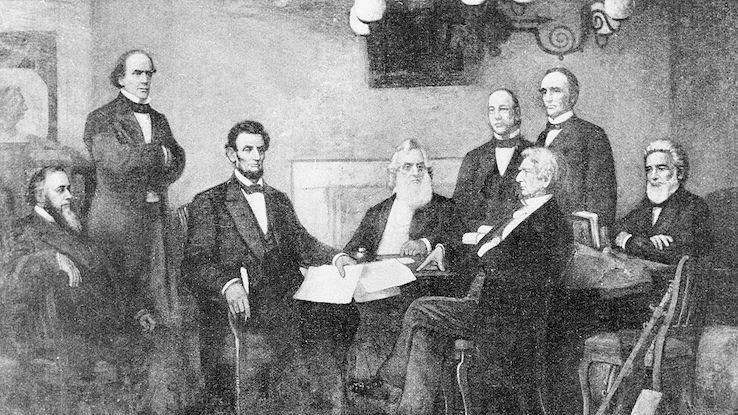
D.C.'s population of people who were formerly enslaved boomed later on the end of the Civil War, and, for a few years, things went well for the growing African-American communities in the district. Though women were nevertheless restricted from voting in federal and local elections, Black men fought for and won the right to vote in D.C.'s municipal elections in 1867. For a brief time, these residents had democratically elected representatives within the local government.
Only racism and control endured. In the 1870s, Congress abolished D.C.'due south local governmental privileges and processes, including its power to elect a mayor. This immune the president lone to appoint the district'southward governor and quango, which replaced D.C.'southward territorial government in 1874. Instead of assuasive the predominantly African-American population to vote for presidents, Senators and Representatives, new legislation gave the interim Commander in Chief full reign over selecting D.C.'s officials.
When a push for statehood began during this menstruation, Senators and other lawmakers used racist justifications to instead strip D.C. of its governance rights, fearing how a bulk-Black voting body might affect their privilege. They continued pushing this grounds for deprival of voting rights for Blackness people, especially when a proposal for D.C. potentially beingness granted Congressional representation was introduced in 1888. Information technology took over 30 years for Congress to begin holding hearings on the affair and simply resulted in a pecker that would've immune Congress to treat the district's residents as citizens of a U.S. state — had it even passed.
Representation Is Redefined in D.C.
In 1961, residents of D.C. secured the right to participate in presidential elections following the Twenty-third Amendment to the Constitution. Notwithstanding, this change came with a caveat that limited the community'due south potential power. Today, as it was in 1961, D.C. is only allowed 3 electors to vote on behalf of residents during presidential elections — which, for a bustling urban center of over 710,000, doesn't seem similar that many, especially considering that Wyoming (population: 580,000) also has three.
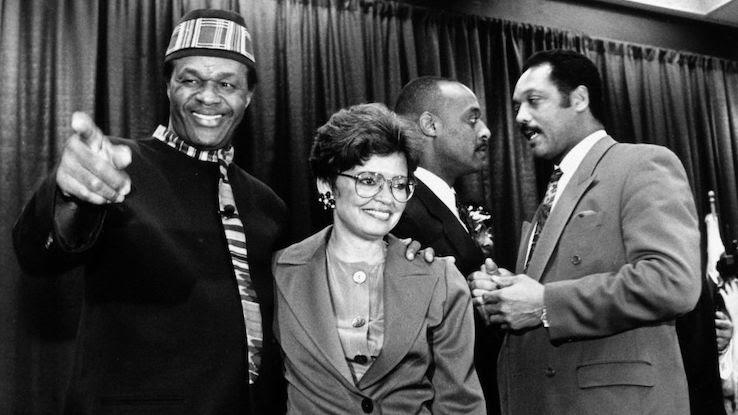
Consequently, the customs's vocalism wasn't as loud equally many residents felt it rightfully should've been; in the political epicenter of the nation, people who lived in D.C. felt they were underrepresented politically. But before long after they gained the ability to vote for president, D.C. residents obtained another government victory that buoyed them — for a while. By 1971, the commune had been granted a single Representative to the House, and, in 1974, elections for Mayor of the Commune of Columbia again became one of the well-nigh constructive ways for citizens to exert influence on local politics.
Still, in that location was aplenty open soapbox on the topic of D.C's ability to self-govern, forth with its demographics. This discourse endures today, and it has some politicians worried. Voters in Washington, D.C., most universally elect democrats — in the xv presidential elections D.C. residents take participated in, they've voted for the democratic candidate 15 times. This has caused more than a piddling hesitation on behalf of some republican lawmakers and politicians, as those in power worry that a semi-autonomous D.C. might never elect a republican or conservative-leaning official ever again.
In addition to this, a mutual argument against D.C.'due south statehood is that New Columbia, a proposed name for the potential land, would accept the power to exert excessive influence on the federal authorities considering of its concentration of political institutions. The U.Due south. government would finish upwardly relying on one state for the majority of its operations — a land that would begin voting for the best interests of its people instead of the institutions within it.
Many Supporters Contend It's Past Time for Change
Proponents of D.C. statehood have plenty of counterarguments up their sleeves, chiefly that the district'south residents contribute massively to the success of the U.S. regime but accept nobody in that regime — at least non in Congress — fully representing them. They're responsible for funding the federal authorities with taxes and following the laws information technology enacts, but they don't "enjoy the benefits and protection of having voting representation" and "this situation is simply not off-white," explains Senator Thomas Cynic of Delaware. In addition, this disenfranchisement is a articulate violation of civil rights in a democratic order, and D.C. statehood supporters believe this needs to exist corrected.
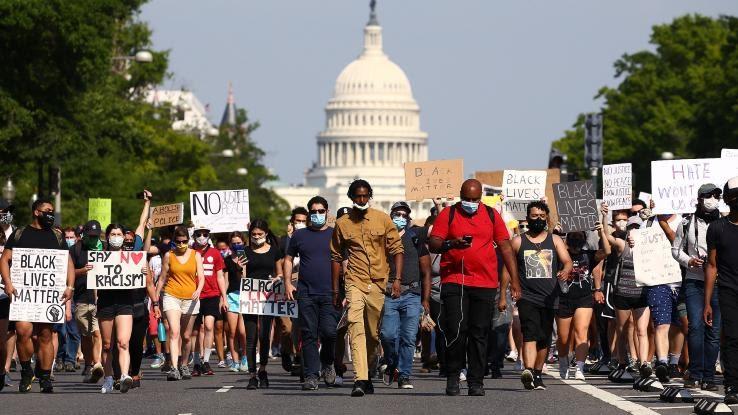
Supporters too dispute the argument that historically and constitutionally D.C. was only meant to be the seat of the federal government by acknowledging that the Constitution has enshrined a number of other injustices, such as slavery and the disenfranchisement of women, that were later corrected. Similar changes could be made for D.C. instead of relying on the words of a 230-year-sometime document that no longer reflects the desires of the populace those words govern.
The District of Columbia is home to about three-quarters of a million twelvemonth-round residents — which means that there are currently hundreds of thousands of people living in the The states who lack local representation just because of where they live. These are hundreds of thousands of people who "[pay] more in federal taxes than 21 states and more than per capita than whatsoever state." The residents of D.C. have been fighting — and paying — for increased representation for more than a century, and many argue that it's by time they get their dues.
While D.C. does have its single Representative in the House, this official is technically a delegate who doesn't wield the aforementioned ability as Representatives from other states and cannot vote on proposed legislation. Additionally, the commune has what are called shadow Senators "to button for D.C. to become the 51st state" by maintaining a presence within Congress; yet, these politicians cannot participate in full floor or committee votes. Statehood supporters argue in that location's no reason to keep treating the residents of D.C. like 2nd-class citizens by disallowment them from enjoying the same voting rights and representation as everyone else in the country.
What Does the Future Concord?
In June of 2020, a motion to grant statehood to D.C. was approved by the House of Representatives, but this bill, titled the Washington, D.C., Access Act Hr-51, died months subsequently at the end of the 116th Congress. Just times are changing: D.C. residents have continued holding out hope, and politicians have continued the button. The Access Act was later revived in Jan 2021, and a companion bill, titled Due south.51, was besides introduced that month with provisions to allow D.C. to join the Matrimony as a state named Washington, Douglass Commonwealth. Both bills would requite the new democracy equal political footing with the other states in the country, and these pieces of legislation immediately began picking up enough of steam in the months following their respective resuscitation and unveiling.
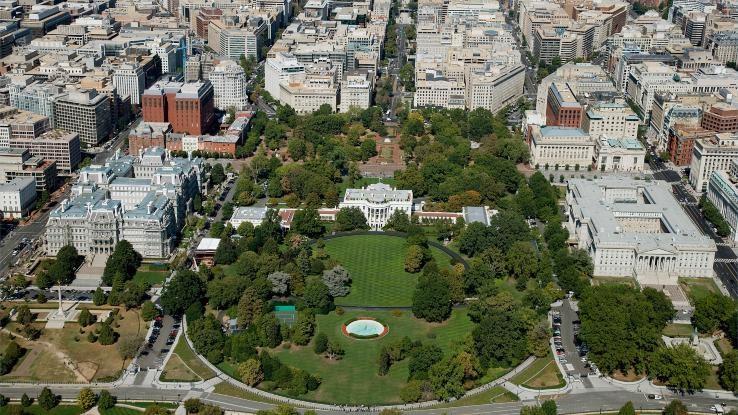
In March of 2021, a Congressional hearing took place amid the House Committee on Oversight and Reform to gauge support for HR-51, and a vote among all Firm members is likely to come on the calendar week of April 19 after committee members mark up the neb — a process that allows for editing and rewriting in training for a full vote — on April fourteen. If the pecker is approved in the House it will over again accelerate to the Senate, where it "faces long odds" and the legislative delay as a probable obstacle.
Regardless of the outcome of the upcoming vote, it'due south unlikely D.C.'south residents volition surrender the fight for off-white representation. Every bit politicians realize the full importance of creating and enacting legislative changes that meet the demands of the public, and as D.C. locals continue to challenge the status quo, the district's rise to statehood may be growing e'er nearer — at concluding providing the representation people are fighting for.
hedlundmicketionath.blogspot.com
Source: https://www.reference.com/geography/why-isnt-washington-dc-state?utm_content=params%3Ao%3D740005%26ad%3DdirN%26qo%3DserpIndex
0 Response to "Speeches From the Never Again March in Washington D.c. Video Youtube"
Post a Comment